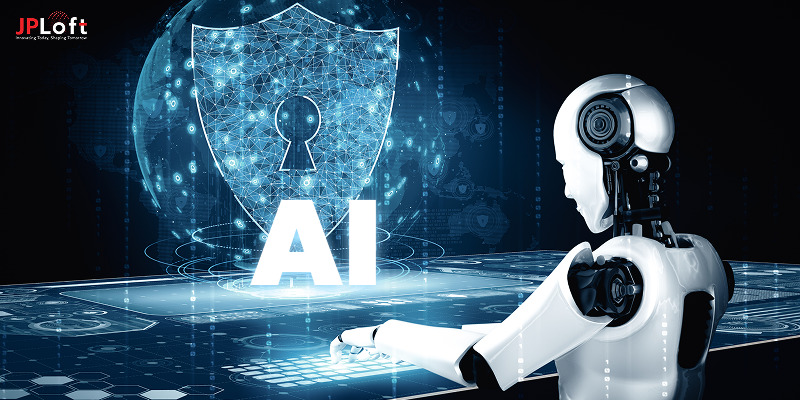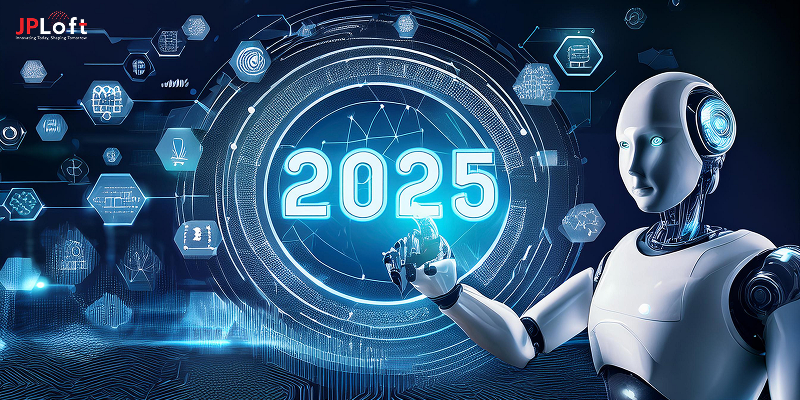Due to the explosion of mobile devices and app stores, demand for sophisticated mobile applications that deliver exceptional user experiences has skyrocketed. Therefore, mobile app developers are constantly exploring innovative techniques that utilize new technologies and help enhance the design and development process for these apps. Artificial Intelligence (AI),one of the latest technological breakthroughs, has revolutionized mobile app development.
AI in mobile app development
which seeks to enable machines to imitate human Intelligence - has had profound ramifications across industries, including healthcare, finance, retail, and transportation. AI technologies and machine learning algorithms offer tremendous potential in mobile app development services automating development processes, understanding user preferences, adding Intelligence to apps, and creating personalized experiences for their users. In this article, we explore how AI is revolutionizing mobile app development as well as some recent trends such as app redesign and development trends driven by artificial Intelligence (AI).
Why Is Artificial Intelligence Perfect For App Development?

Based on this principle, the ideal technologies are those that reduce our daily workload the most significantly. Artificial Intelligence (AI) can alleviate some of the tasks humans find most tedious in life by extracting key pieces of information and acting as a replacement.
AI in mobile app development can recognize whatever you create, hence its ability to produce and understand both visual and audio content alike. The smartphone revolutionized how many of us interact with computers. People begin their day and their time using their pocket computers by turning on their pocket computers every morning, from opening email apps on desktop computers to using them during personal time, such as going to post offices or, opening desktop email applications on smartphones, and more.
Add machine learning into this equation, and its equation becomes ever simpler - as humans communicate frequently (another task),there is enough data for training an AI model so it can recognize speech with sufficient probability, providing ever less friction between human users and machines. Humans communicate frequently, providing enough data for an artificial intelligence model to generate or recognize speech with equal quality. Also, due to having faces, humans have provided sufficient data for training an AI model that generates or recognizes faces, among other things. The aim is always to minimize friction between humans and machines. AI and mobile phones are inextricably linked from a user perspective; hence, their integration is seamless.
AI Applications in Mobile App Development Are Becoming Ever More Popular

Artificial Intelligence has taken hold in the tech industry over recent years, offering innovative ways to boost performance. By 2030, it is projected that the global AI market will reach an astounding $2 trillion, reflecting its rapid development despite only recently becoming mainstream. But you don't have to trust us; here are key statistics about AI market growth. Recent statistics reveal that over 70% of consumers already utilize AI-powered mobile app development trends on a regular basis and that the market size for AI-driven app development could reach $73.27 billion by 2027. According to Allied Market Research's survey report,
AI market size is projected to experience dramatic growth between 2020-2030 - increasing from $8.56 billion today to an expected $84.80 billion market by 2030 with compound annual compounded annual growth rates of 26.44% from 2021-2030. Given these facts and figures, tech startups and businesses alike may be eager to adopt AI mobile applications into their businesses. Still, the question remains as to why AI should be integrated into mobile apps for business use, and how AI tools for mobile app development will support future-proofing your enterprise.
How Can Mobile App Development Companies Implement AI?

Artificial Intelligence and Machine Learning integrated Android and iOS app development is increasing at an alarming pace, and entrepreneurs prefer working with top mobile app development companies to enhance their applications using this cutting-edge technology. Skilled mobile app developers and AI engineers compete to craft apps that not only meet business organizations' requirements but also become the best apps in their respective categories. But for complete AI-powered apps to be created remotely by app developers, some aspects of AI must be carefully taken into consideration to make an app truly intelligent in its true sense. Below are a few considerations offshore app developers must keep in mind while creating AI-powered mobile applications:
Want To Hire Mobile app developer for your mobile application development ?
Get 30 minutes free consultation with our experts!
Click here for free callDiscover Issues to Solve with AI
AI in mobile app development can be implemented into various aspects across industries. Artificial Intelligence can be implemented into these apps in multiple ways depending on the requirements to make the best use of it. So, we must identify which part of our mobile app could most benefit from AI integration.
- Are You Seeking Personalization Services in Retail Apps?
- AI for Food Delivery Apps or To Bridge the Gap between Demand and Supply in Taxi Booking Apps?
Understanding your requirements makes implementing and using AI much simpler and to the optimum level.
Know Your Data
Enterprise AI requires intelligent data. As a business, to gain maximum business insights from AI, your data must be original, informative, up-to-date, relevant, and enriched. In the first stage, identify where this data would come from - Artificial Intelligence apps depend on humans providing accurate input - then refine and verify data before feeding AI modules with high-quality and relevant information.
Set Metrics
Once an entrepreneur understands their problem, they can use AI metrics to monitor their success. Skilled dedicated Developers should regularly measure model performance across key segments and set alerts if any performance drops off significantly. Hiring AI experts will ensure that every case is examined thoroughly, paying particular attention to failed ones. Here, AI professionals can make necessary modifications so as to cover common patterns missed by AI algorithms.
Employing Data Scientists
Many global companies employ full-scale data scientists in order to extract maximum value from raw data. Data scientists specialize in studying, visualizing, and exploring it via various means in order to learn about different aspects that could have an effect on business operations and perform necessary statistical analyses that help your company excel in Artificial Intelligence games. You could also partner with an AI app development company with experienced data engineers as part of their team.
Machine Learning's Impact on App Development
Machine learning, an area of AI, has transformed app development by enabling apps to learn and adapt based on user interactions and data analysis. Here is how this revolution has changed the app development landscape:
- Predictive Analytics: Machine learning algorithms can sift through vast amounts of data to spot patterns and trends. By harnessing predictive analytics, developers can make data-driven decisions such as predicting user preferences, forecasting demand forecasting app features to increase engagement for optimal user engagement.
- Intelligent Personalization: AI in mobile app development and personalization algorithms enable apps to offer highly tailored experiences to their users by taking into account preferences, behavior, and demographic data to provide tailored content, recommendations, and user interfaces to increase satisfaction and engagement among end users.
AI-Powered Mobile Apps
Artificial intelligence-powered applications are having an incredible impact across a range of sectors - from health and nutrition apps, gaming apps, and personal assistants all the way through to personal assistants leveraging artificial Intelligence for innovative, customized experiences. Let's examine some exemplary AI-powered mobile apps that have captured the interest of users worldwide.
Health and Nutrition Apps
AI has revolutionized how we approach our health and well-being. Apps such as MyFitnessPal and Lifesum utilize AI algorithms to track user activities, analyze nutrition data, and offer personalized recommendations for leading a healthy lifestyle. These apps enable their users to set goals, monitor progress, and make educated decisions for optimal well-being.
Recommender Mobile Apps
AI-powered recommendation apps such as Netflix and Spotify have revolutionized how we discover entertainment content. By taking into account individual preferences, behaviors, and interaction history, they deliver personalized recommendations based on customized algorithms. By employing AI algorithms, entertainment services provide personalized playlists and suggest relevant movies, TV shows, and music that make our entertainment experiences more pleasurable and immersive.
AI in Gaming Mobile Apps
Gaming mobile apps have seen dramatic transformations with the incorporation of Artificial Intelligence (AI). Games such as Pokémon incorporate both AR and AI-powered features for engaging gameplay experiences. AI algorithms adjust game difficulty based on player skills, create intelligent virtual opponents, and produce compelling storylines - increasing user engagement and excitement!
Siri
Siri, as we all know, is Apple's virtual assistant and an invaluable ally for millions of iPhone users worldwide. Leveraging artificial intelligence technology, Siri understands natural language queries, completes tasks efficiently, and offers recommendations. Siri's AI capabilities have completely revolutionized how we use our mobile devices, from setting reminders and sending messages, answering queries, controlling smart home devices, and more - no one can dispute this fact! No doubt.
Fyle
Fyle is an AI-powered expense reporting app designed to streamline and automate expense reporting for professionals. Leveraging optical character recognition (OCR),machine learning, and natural language processing (NLP),Fyle extracts data from receipts, classifies expenses, and creates reports automatically. AI now makes this app capable of saving businesses and individuals time, reducing errors, and increasing efficiency. Now, you have seen real-world examples of AI in mobile app development that provide evidence for including AI in your current or upcoming mobile app development project. However, you might be asking who develops it and where you can purchase quality development at an affordable price. Below, you will discover more details.
AI Tools in Mobile App Development

Artificial Intelligence can be an incredible advantage for platforms like iOS or Android app development, so let's examine its various uses within an application. Let's also take a closer look at what exactly can be leveraged from this form of tech in our respective apps.
Chat Automation
Mobile applications compete hard for user engagement, so ensuring a positive experience and top-tier support are of utmost importance. Yet keeping agents available around the clock can become costly when multiple requests can easily be resolved quickly. Chat Automation could provide the answer. Integration of chatbots powered with AI in mobile app development can be proven to be the effective solution. These intelligent tools can automate customer support for mobile applications through natural language processing; the system will use its AI abilities to decipher customer inquiries, retrieve relevant information from databases, and present it back in a manner pertinent to users. AI-powered chatbots are one of the most frequently utilized artificial intelligence applications, as they can significantly lower operational costs for businesses. Gartner forecasts that conversational AI will reduce contact center agent labor costs by an estimated $80 billion by 2026. Remember to consider this cost- and time-efficient AI use that's sure to increase customer service levels and loyalty.
Digital Assistance
Leveraging voice and speech recognition technology, virtual assistants can recognize both a speaker's voice as well as what they are actually saying so as to carry out commands with no need for clicks within an application. This enables your users to interact seamlessly with it. Virtual assistants provide great time-saving benefits, but they also can be useful to users who may need to issue commands while driving or engaging in another activity that occupies both hands simultaneously. Speech recognition is vitally important to those living with disabilities, so to make your app truly inclusive and welcoming for all users -- virtual assistants must be an integral part of it. AI can also assist with internal processes like contact center performance. It can provide dynamic call scripts and dialogue suggestions in real-time to your sales team, helping employees adapt to every call efficiently while catering to each customer as optimally as possible.
Security
Security for app users is of utmost importance, especially those who rely on solutions like mobile banking or online shopping that process digital payments or work with sensitive information. Therefore, the more secure your app is -- the better off its users will be; AI can aid here, too! Artificial Intelligence can protect both you and your users by processing huge volumes of data quickly at high speeds to detect cybersecurity threats, then alerting both of you immediately - meaning your app's security will only strengthen over time! With well-trained machine learning algorithms learning from past experiences, security will only get stronger over time. AI in mobile app development can add another level of protection to your app's biometric authentication by increasing the accuracy and efficiency of the system, specifically by converting biometric data such as fingerprints or facial scans into information that can be analyzed against a database.
Predictive Analytics
Predictive analytics is an integral component of any successful business. From healthcare to retail and finance, analytics helps analyze performance, gain customer insights, and optimize service delivery. Artificial Intelligence will help businesses to overcome various challenges in mobile app development once such is, how you approach app analytics forever. Utilizing advanced algorithms that seamlessly sift through customer usage data. AI in mobile app development will allow for insightful analyses as well as predictions that help predict what might happen next - helping to prepare you for anything that comes your way. From user behavior changes to accurate demand forecasting for products and services - AI will take analytics a step further and help your app continuously improve for maximum business performance.
Object Detection
AI technology is also useful in mobile phone apps for object detection. If your application relies heavily on visuals, image recognition technology and artificial Intelligence can work together to quickly recognize objects, people, locations, or any other significant elements within an image. Your healthcare app could benefit greatly from AI technology to enable better disease diagnosis. Your staff can upload scans or photos of an anomaly for rapid analysis by algorithms, which will then provide suggested diagnoses. Image recognition software has the potential to expedite underwriting and claim processing tasks in insurance significantly, primarily by quickly and accurately assessing damages from photos as well as scanning social media for risks that might present themselves.
Personalization
We could only end this list of use cases by discussing personalization. As was noted earlier, the mobile app market is highly saturated; therefore, standing out from the crowd is crucial, and AI in mobile app development provides just that opportunity. By carefully monitoring user activity within your app and understanding their individual preferences, you can create solutions that provide customized experiences for every customer and leave a positive, lasting impression that motivates them to return time after time. AI can be particularly advantageous to mobile app owners offering online products and services since AI will be able to provide relevant suggestions that increase purchase completion rates.
Key Takeaways

Businesses pursuing artificial intelligence (AI) solutions need an experienced partner that understands its complexities - JPLoft offers exactly this service to anyone interested in integrating AI in mobile app development projects. Hire remote mobile app developers from JPLoft to create applications that utilize this form of Intelligence in ways that best serve their needs and those of their respective businesses. Our team is committed to helping you develop an AI-powered mobile app that meets your business requirements. While AI implementation may still be relatively new, we're here for every step of the journey and provide expert guidance and assistance along the way. No matter whether you need an AI developer for new app development or an app upgrade, we offer comprehensive AI development services at reasonable rates.
FAQs
-
What is the role of AI in mobile app development, and why is it important?
AI plays a crucial role in mobile app development by automating tasks, improving user experiences, and enhancing app performance. It can optimize app design, personalize content, and enable features like voice recognition, making apps smarter and more user-friendly.
-
How can AI-powered tools benefit mobile app developers?
AI-powered tools can benefit developers in several ways. They can assist in automating code generation, debugging, and testing, reducing development time and errors. AI can also provide valuable insights from user data, helping developers make data-driven decisions to improve app performance and user engagement.
-
What are some AI-based strategies for mobile app development?
Some AI-based strategies for mobile app development include:
- Predictive Analytics: Using AI to analyze user data and predict user behavior, preferences, and trends.
- Chatbots and Virtual Assistants: Integrating AI-powered chatbots or virtual assistants to enhance user interactions.
- Recommendation Systems: Implementing AI algorithms to suggest personalized content and products to users.
- Natural Language Processing (NLP): Incorporating NLP for voice recognition, language translation, and sentiment analysis.
- Machine Learning Models: Leveraging machine learning for fraud detection, user segmentation, and content curation.
-
Are there any challenges or risks associated with using AI in mobile app development?
Yes, there are challenges and risks. Some common issues include:
- Data Privacy: Handling user data responsibly and ensuring compliance with data protection regulations.
- Algorithm Bias: Addressing biases in AI algorithms that could result in discriminatory or unfair outcomes.
- Complexity: Integrating AI into mobile apps can be technically challenging and require expertise.
- Cost: Developing AI-powered features may involve higher development and maintenance costs.
-
How can mobile app developers get started with AI integration in their projects?
To get started with AI integration in mobile app development, developers can follow these steps:
- Learn AI Basics: Gain a foundational understanding of AI concepts, algorithms, and tools.
- Identify Use Cases: Identify where AI can add value to your app, such as personalization or automation.
- Access AI Libraries: Utilize AI libraries and frameworks like TensorFlow, PyTorch, or pre-built APIs for specific AI functionalities.
- Collect and Prepare Data: Gather and preprocess data for training AI models.
- Start Small: Begin with simple AI features and gradually expand as you gain experience.












Share this blog